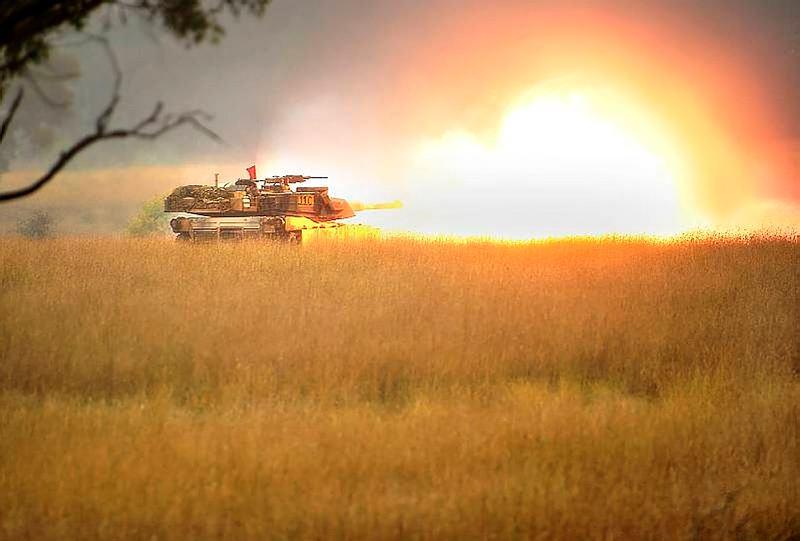Russia’s Victory Day Parade and LAND 400
Posted By Joshua Jardine on June 16, 2015 @ 15:00
The thunder of armour heralded the march of the Immortal Regiment on 9 May in a gratuitous display of Soviet-esque pomp and power. For international audiences, the Victory Day message was clear: Russia stands unbowed by current sanctions, international opinion and volatile oil prices, and continues to plough money into military modernisation.
Back in Australia, the LAND 400 team in the Department of Defence watched the official unveiling of the Armata universal combat platform during the march with great interest. Armata has been an ambitious and expensive Russian project to deliver a common chassis platform to replace their aging armoured vehicle fleet. Given its shared Armata chassis design, the T-15 Infantry Fighting Vehicle is expected to tip the scales at a hefty 40 tonnes. It’ll offer a level of protection unmatched by current infantry fighting vehicles thanks to its mass and advanced armour design.
The impetus for the replacement of Russia’s vehicles was not to conduct sweeping tank battles across Europe but to plug the capability gap identified at the hands of Chechen guerrillas in the 90s. The Kremlin have been forced to learn some hard lessons in the design and employment of armour. The First Battle for Grozny in 1994 and and the second in 1996 demonstrated the vulnerabilities of unsupported armour in an urban environment. The engagements crystallised the Russian understanding of what’s needed to compete in a contemporary operating environment: protection first, mobility next and lethality last.
The short-range antiarmour weapons that wreaked havoc on armoured convoys in Grozny is touted to have been countered with the development of Active Protection suites such as the Afghanit and Malakhit Explosive Reactive Armour which protect vehicles by disrupting or destroying munitions before they penetrate. Crew survivability has been addressed by a radical design change in placing the engine forward to provide additional protection on the frontal arc. The 30mm cannon is the same weapon system found on the Kurganets-25, however, there’s a clear future growth path to the developing AU-220M remote controlled 57mm cannon. The T-15 also carries four of the capable Kornet anti-tank guided missiles. Another significant variation to standard design is the inclusion of a completely unmanned turret which reduces the crew requirement from three to two.
For LAND 400, the unveiling of the T-15 means that the bar for protection and mobility has been set—and set high. Phase 3 of LAND 400 (Mounted Close Combat Capability) will acquire Infantry Fighting Vehicles and Manoeuvre Support Vehicles. Infantry Fighting Vehicles lift infantry soldiers and support the M1A1 Main Battle Tank as a part of the combined arms team that conducts sustained joint LAND combat. Grozny demonstrated that groups of small, relatively unsophisticated non-state actors have the ability to inflict significant damage on ill-prepared and ill-equipped conventional forces. The ADF must be prepared to operate in an urban context, on continental Australia and within our region. The Army must have the ability to survive and defeat the threat posed by short-range, anti-armour weapons, or face the prospect of unacceptable losses of personnel and material.
From about 2025, LAND 400 Phase 3 will replace Army’s current M113 AS4 armoured personal carrier fleet; a fleet that neither meets the capabilities of Plan Beersheba [2] nor the requirements listed in the 2013 Defence White Paper [3]. Acquiring a platform that can be deployed by air and sea and operate successfully in a crowded, connected and lethal environment [4] will be a challenge. There are many excellent Military Off the Shelf (MOTS) vehicles on the market that have a proven operational record and the potential to accommodate future capability improvements. It will require a significant investment by government to realise a vehicle that provides the necessary protection, firepower and mobility for our soldiers to operate as part of a joint or coalition military force. But it will be an essential investment for a defence force required to offer viable military options where government identifies Australia’s interests are at stake in an increasingly uncertain region.
Australia finds itself in an unenviable position, balancing fiscal realities and competing budget pressures against the requirement to replace our aging armoured vehicles fleets, while being prepared for a number of contingencies and strategic futures likely to unfold with little or no warning. In such a tight financial environment, it’s easy to lose sight of the potential costs in manpower and risk of mission failure of financial conservatism. Ahead of ASPI’s Future Force Structure Options Conference [5], it’s prudent to ask, ‘What’s the right armoured fighting vehicle mix for the Australian Army?’ And once we’ve asked that question, we should be willing to look to, and learn from, international experiences with similar platforms.
Article printed from The Strategist: https://aspistrategist.ru
URL to article: /russias-victory-day-parade-and-land-400/
URLs in this post:
[1] Image: https://aspistrategist.ru/wp-content/uploads/2015/06/20110512adf8106603_088.jpg
[2] Plan Beersheba: http://www.army.gov.au/Our-future/Projects/Plan-BEERSHEBA
[3] 2013 Defence White Paper: http://www.defence.gov.au/whitepaper/2013/docs/WP_2013_web.pdf
[4] crowded, connected and lethal environment: http://www.army.gov.au/~/media/Files/Our%20future/Publications/FLWR_Web_B5_Final.pdf
[5] Future Force Structure Options Conference: https://www.aspistrategist.ru/events/armys-future-force-structure-options
Click here to print.
